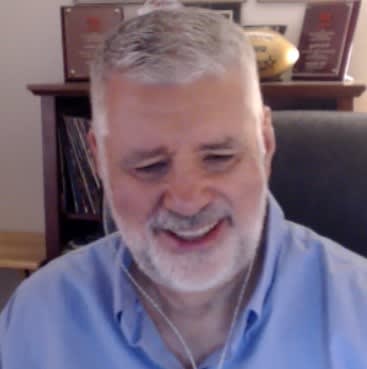SOUTH BEND, Ind. — Brian Kelly in 2012 had seemingly everything he needed to have the confidence in his Notre Dame football team to get aggressive on offense when it came to fourth-down situations.
An offensive line that featured a future perennial All-Pro guard playing left tackle (Zack Martin) and a high-round draft choice at left guard in Chris Watt to complete the formidable left side. A mobile quarterback in Everett Golson and a savvy one in the bullpen in Tommy Rees.
The then-Irish head coach also had a dominant defense that, theoretically, could make failed fourth-down conversion attempts more forgiving.
More Content
► More painful than Notre Dame baseball's bubble bursting, C Carson Tinney to transfer
► Notre Dame's Mike Mickens continues to impact Irish, even without DC title
► Freeman evolves from flattening the learning curve to getting ahead of it
► OT Gregory Patrick's return boosts Notre Dame's star power in new Rivals250
► Updating Notre Dame's depth chart projection heading into summer workouts
What Kelly didn’t have was Anthony Treash during ND’s run to the BCS National Championship Game that season. Or anything or anyone quite like him, as Kelly and the Irish attempted just six such conversions and managed to get a first down or TD on just three of them.
Twelve seasons later, with Treash serving as the football program’s director of analytics in a newly created role, Notre Dame and current head coach Marcus Freeman opted to go for it 30 times in the 2024 season — ND’s first season in which it played for the national title since the 2012 group.
And the Irish converted 22 of those 30, for a 73% success rate.
That’s the second-best conversion rate on fourth down in a season since Notre Dame began archiving that stat in 1986 and the eighth-best success rate among the 133 FBS teams the NCAA charted in 2024. It’s also a significant improvement on ND’s 2023 (10-for-17, 59%) and 2022 (7-for-16, 44%) fourth-down rates, Freeman’s first two seasons as Kelly’s successor.
The fact that the former Pro Football Focus scouting and analysis savant is back in 2025 for a second season and with a fancier title as of last month — Notre Dame’s director of football strategy — speaks to Freeman’s perception of both the value of the position and the person manning it, not just when it comes to fourth downs.
The returning Irish players started their summer program on Monday, with the 2025 season opener at Miami set for Aug. 31.
“He is obviously my right-hand man on game day in terms of game-management decisions,” Freeman said, during a recent small-group interview, of Treash, a 2019 Indiana University grad. “But a lot of that work is done throughout the week. We meet three, four times a week — one to learn from our experiences, from other people’s experiences but also to prepare.
“The first couple of days we might say, ‘Let’s learn from our game. Let’s learn from the NFL. Let’s learn from other college teams. What would I do in that situation? What would you do? Would you accept the penalty? Would you go for it? Dah, dah, dah.’ All these different situations.
“And then as we get closer to game day, we say, ‘OK, what’s the plan? Hey, what’s the book telling us where we’re going to go for it? Let me communicate with the coordinators. Where’s the kick line? All those different things.’
“That’s in terms of game management. But he also has a lot of value in helping with the personnel, with using analytics in terms of evaluation, and that’s been something that he’s done a terrific job of doing.”
Freeman had access to analytics in his first two seasons as ND’s head coach, before Treash arrived. But Treash’s presence on the sideline, in meetings and the context he brings helped nudge the trends and numbers application to another level.
But so did Freeman finding the sweet spot in 2024 in blending analytics with his own instincts and experience, a balance that was somewhat elusive in his first two seasons in leading the Irish.
“There’s not a situation where I said, ‘Hey, Treash, should we go for it on fourth down here?’” Freeman said. “He’ll tell me: what’s a go? That’s his job. What’s a go? He’ll tell me that on every down. What’s a go? I make the decision on: do I want to go for it or not?
“I communicate with [offensive coordinator Mike] Denbrock on what I think on third down. It’s the work that’s done outside of Saturdays that has been more beneficial than anything.”
And then it’s introduced on Saturdays into all the other factors that play into in-game decisions, and not just the ones that involve whether to kick a field goal, punt or play on on fourth down.
“A lot of my decisions on fourth down is the confidence I have in our offense,” Freeman said. “When you have a quarterback that you believe can get any first down, you’re going to make those decisions.
“On third [down], you’re going to sequence calls to be able to go for it on fourth. It wasn’t going for it on fourth down as much as some of the decisions on two-minute situations, how I want to use the timeout. There’s a lot of little things that you guys probably don’t even care about that goes into game management.
“Snap the ball at six seconds on the play clock, because we want to make sure that we’re going to have to snap it again before a two-minute situation. That’s more important than anything.”
Notre Dame last season happened to be one of the best teams nationally in defending fourth-down conversions as well (9th at 36.6%, 15-of-41 allowed). And a special teams juggernaut when kicker Mitch Jeter was healthy, and still formidable on the other parts of special teams when he wasn’t.
All of which help the Irish in the margins toward not just playing in a national championship game but winning one.

• Talk with Notre Dame fans on The Insider Lounge.
• Subscribe to the Inside ND Sports podcast on Apple Podcasts, Spotify, SoundCloud, Podbean or Pocket Casts.
• Subscribe to the Inside ND Sports channel on YouTube.
• Follow us on Twitter: @insideNDsports, @EHansenND and @TJamesND.
• Like us on Facebook: Inside ND Sports
• Follow us on Instagram: @insideNDsports

